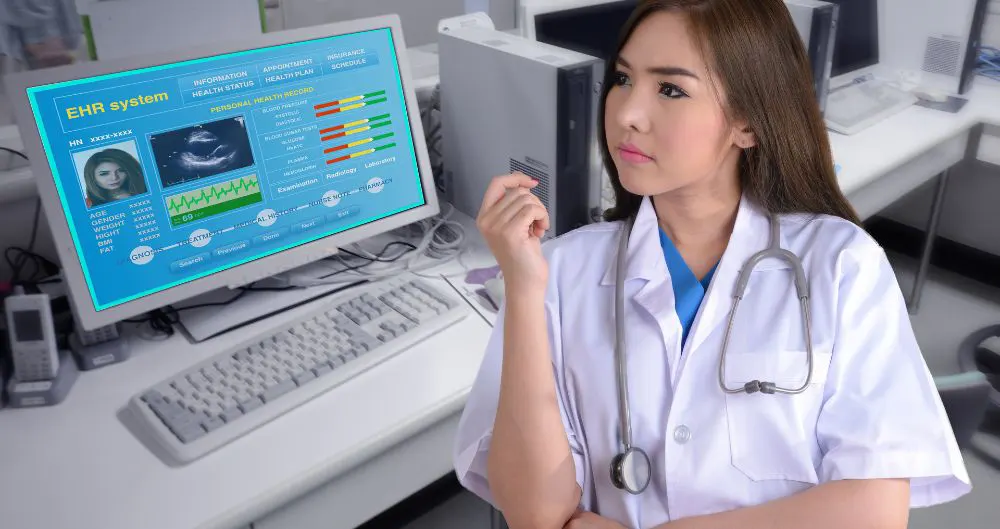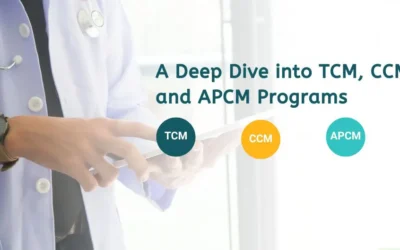
Importance of EHR Integration to Scale a Virtual Care Management Program (CCM & RPM)
Medical records and patient data can be retrieved, shared, and managed across various electronic software solutions inside health organizations and other digital health platforms by integrating an EHR from a healthcare professional.
This integration provides the interoperability of various healthcare systems and applications including; Hospital Information Systems, Billing applications, Telehealth applications, and Virtual care management applications like Remote Patient Monitoring (RPM) or Chronic Care Management (CCM). The cohesive, integrated, and compatible system serves the healthcare profession by delivering the most current patient information to treat patients effectively.
Implementing an EHR-integrated Virtual Care Management program plays a key role in enhancing the scalability and effectiveness of the programs; particularly across four key areas:
Integrating Patient Records
EHR integration produces a cohesive record by combining the patient’s data from various sources. Information from the following sources is included in this consolidation:
It is possible to combine patient records from numerous healthcare providers, primary healthcare physicians, and hospitals into a single accessible EHR. This integrated perspective is essential for coordinated care, especially for individuals suffering from complex medical conditions.
Data can be easily transferred from wearable devices and remote monitoring technologies to the EHR so that healthcare professionals can easily access recent health data and trends.
Patients can also share their data via the health applications or through the patient portals. This patient-generated data provides the information that can be used for clinical assessments.
Multi-disciplinary Access
Multidisciplinary access to patient records is made possible by EHR integration, guaranteeing that:
To promote a team-based care approach, healthcare professionals from different disciplines can easily access and exchange the patient regarding information. This collaboration is very crucial in virtual care management, where multiple physicians may get involved in the treatment of patients.
A complete and detailed history of the Patient allows doctors to get a better understanding of the previous treatments, allergies, and medication responses which results in informed decision-making and care continuation.
Easing the Load of Administration
Integration of EHR decreases the tasks of administration by automating the process like:
Integration of the EHR systems can automate the data entry and documentation process, enabling healthcare providers to concentrate more on patient interaction rather than paperwork.
The cohesive, integrated, and compatible system serves the healthcare profession by delivering the most current patient information to treat patients effectively.
Enhancing Patient Care Efficiency
EHR integration improves patient care efficiency through the optimization of workflows through:
The cohesive, integrated, and compatible system serves the healthcare profession by delivering the most current patient information to treat patients effectively.
EHR integration helps healthcare professionals recognize the trends in patient demand, which results in more effective resource allocation and staffing to fulfill patients’ demands.
Instant Access to Health Records
EHR integration facilitates near real-time access to patient health data, which is essential for:
Healthcare professionals can remotely monitor patients and respond quickly to any health concerns regarding their health. This immediate access enables proactive care and lowers the risks of any future complications.
Patient data is updated in near real-time which has the benefit that healthcare specialists remain informed about the treatment progress, lab findings, and any new health updates which guarantees an adaptable approach to care.
Enabling Swift Interventions
Near real-time data sharing strengthens the communication among the care coordination team, enabling:
Providers can easily convey the message regarding any change in the health of the patient to all other team members, which ensures that everyone is on the same page and able to act properly.
Near real-time data sharing also lets the patients participate in their care. For example, warnings are issued to patients when their health indicators fall outside of appropriate ranges, which enables them to take the necessary actions to seek medical attention.
Monitoring Patient Results
EHR integration enables the systematic monitoring of the patient’s outcomes during the time, which is very important for:
Providers can investigate the efficacy of a particular kind of treatment plan and subsequently make changes for the better by being informed by data.
Healthcare organizations can use the outcome data to find out where changes can be made, to make them, and to see how they are affecting the organization.
Identification of Health Trends and Patterns
The collection of data through EHR integration can be examined for the identification of the latest trends in health that inform regarding the clinical practice:
By examining the aggregate data, healthcare organizations can acquire population health insights and discover the trends in healthcare within specific populations. This allows them to develop targeted strategies and better utilization of resources.
A form of big data can forecast future healthcare requirements and results from past data which helps healthcare providers to be ready for future issues and improve healthcare services.
For a successful EHR integration, read our latest blog post, Top Strategies for Seamlessly Integrating with an EHR. You’ll find valuable insights and expert guidance on how to overcome common challenges and enhance patient satisfaction.
Gen By Gen Health's turn-key CCM/RPM solutions ensure compliance and health literacy – improving patient satisfaction and outcomes, increasing revenue, and decreasing staff workload.
To get in touch call us right now at (908)-864-0098 to learn more about our CCM services or you can also book a 30 min free consultation.
You may also like
The Power of Patient Engagement in Driving Better Outcomes
Using patient engagement strategies requires intentional action, but the benefits are significant. People engaged in their care usually follow care plans, control their chronic health problems well, and stay in touch with their doctors. When you start focusing on...
Advance Primary Care Management (APCM) and Who Can Bill For It
Advanced Primary Care Management (APCM), which started in 2025, is the latest care management program from CMS. Unlike older care management plans, it supports every Medicare beneficiary, irrespective of how many chronic conditions they have. As APCM is just starting,...
A Deep Dive into TCM, CCM, and APCM Programs
Transitional Care Management (TCM) is a service that allows Medicare to pay for help given to a person transitioning from a hospital to their home. TCM strives to prevent patients from being readmitted in the first 30 days after they leave the hospital. At this point,...



